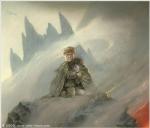 Fredwin, on 07 July 2015 - 02:15 PM, said:
Fredwin, on 07 July 2015 - 02:15 PM, said:
Finally got around to reading this and I have to agree with some of the sentiments here. It's quite a good book but it seems to spread itself a bit too thin, some stories are padded quite a bit while others are left unresolved.
The first half of the book is extremely strong. Enjoyed the prologue and the setup for each group of characters, I also really liked the geography and build of the blood feuds between the Icebloods/lowlanders. With there being kind of a free-for-all between the Jag-hum/Jaghut clans of the mountain valleys themselves and then the lowlanders as well. Pretty cool though, how each holding with the help of their ancestors would defend against each of their neighbors, like super tiny city-states, the only problem being that it seems really similar to the mountain Teblors/lowlanders feud in House of Chains.
Some stories seem extraneous. For instance, can someone tell me what the point of Reuth is? I thought his story would come full circle with us finding out that Storval actually murdered his Uncle during the attack and Reuth eventually getting revenge. That, or he is at least re-united with Kyle at some point, maybe even use his navigational skills to save people. He just doesn't accomplish anything or further anyone else's story. Kyle could have easily arrived through other means rather than Tulan's ship. That was a lot of extra pages right there. Another example, what's the point of Enguf? I totally assumed he would hamper the evacuation or attack the Ragstopper/Resolute/Dawn when left to his own devices out in the sea.
The ending was fairly lacking as already mentioned. I thought a cooler way to show how dire the Crimson Guard's T'lan situation is, would have been for K'azz to basically get really messed up fighting something ridiculous and he's basically torn to the absolute bone yet still on his feet. There's lots of build-up to how Shimmer is going to react to the final news yet she's pretty whatevs' about it. The T'lan mass don't really ever seem a threat to any major characters. They refuse to murder most of the humans, they get cut down pretty regularly throughout, they don't have access to their warren for most of the book, and what's left of them at the end would stand no chance against who they're arrayed against in front of the Forkrul Assail.
A couple of other things... Omtose Phellak is degenerating over the Sea of Dread so navigation becomes possible again, but what happens after it's been renewed at full force? Aren't those ships done for? Lastly, does it make no sense to anyone else that Cal-Brinn would take on a second vow? Not even sure why he was forced to keep the 4th company there for so long, seems kind of renegade.
Interesting post. I myself finally got round to reading Assail last week and came away with many of the old familiar feelings about the ICE books.
I thought that the first 200 pages or so were great, but things then descended into a boring Blood and Bone-esque travelogue that was intermittently spiced up by interesting scenes. In the final 150 pages or so, the book came back to life and delivered a good ending. It wasn't as bad as the atrocious Blood and Bone, but hardly qualifies as a great Malazan novel.
ICE does write good yarns (Night of Knives and OST had elements of that, interspersed with some more negative points), and can occasionally veer towards really something epic (RotCG and STW). He is great at assembling the pieces for a story, and is brilliant on landscapes/settings. But he simply cannot write at the level of literary sophistication that he is aiming for, and which inspired both he and SE. Erikson mentioned Umberto Eco and others as inspirations for ICE and himself, and while SE ascends to the higher literary plane, it would be fanboyish in the extreme, and frankly delusional, to hold that ICE does. He struggles to make characters distinctive or consistently invest them with a 'voice' of their own. In seeking sophistication, his plots end up with too little nuance in some places (characterisation is as subtle as a sledgehammer) and too much ambiguity in others. The mishandling of the Stormriders is the perfect example of that latter point and an enduring black mark on the Malazan series. He also expects a lot of readers - for instance to simply accept that the Crimson Guard are super-interesting, or that the Stormriders are unique bad asses - without ever really earning it. It is this, above all, that I feel holds the books back from reaching their full potential as old-fashioned yarns. Meanwhile in his later books there was a tendency for characters to walk around, doing nothing much except surviving the rigours of a journey that gave ICE the opportunity to write sentence after sentence describing the landscape.
I agree that in many respects comparing ICE to SE is unfair. They are different men who write within a world that is purely fictional. However, let's be clear: the reason why the ICE books are published by Tor is that the publisher knows that anything with 'Malazan' on the front cover will sell a good number of copies to a set of dedicated readers. That appetite derives from the Erikson books.
I tried really hard to develop a better view of ICE's previous books when re-reading them last year. I had a greater appreciation for STW, even though I was disappointed by the Stormriders. But I was
struck by how bad the characterisation was in OST (the first time I read it, I was swept along by the yarn). And Blood and Bone is simply atrocious, only getting worse on the second read. The plot is limited in the extreme. I will now definitely view his existing works as purely 'optional' texts and doubt I'll be revisiting
them in the future.
Criticising ICE isn't simply an unfair longing for SE to write the stories instead, it's based on an objective assessment of the strengths and weaknesses of the books.
I will read his forthcoming
trilogy, but am not optimistic. I just hope that he ditches the travelogue element and concentrates on what he does a decent job of: yarns that move along at a fast pace and which don't give the reader too much time to think about the weaknesses. Overall, he did a good job of this in his first
three books, but the following three showed a marked deterioration in terms of story-telling competence. If he butchers Dancer and Kellanved - as I expect him to - I'll be disappointed.
 Abyss, on 19 January 2015 - 07:34 PM, said:
Abyss, on 19 January 2015 - 07:34 PM, said:
 Help
Help
 Add Reply
Add Reply

 MultiQuote
MultiQuote












